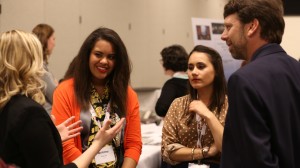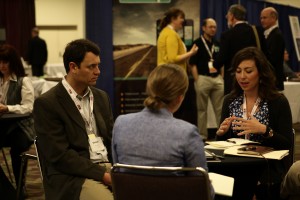The NCPH Annual Meeting topic proposal: What is it?
13 June 2014 – Stephanie Rowe
You may have noticed a new element in the 2015 NCPH Annual Meeting submission process—the topic proposal. The option to submit topic proposals is intended to increase participation in the development of the annual meeting program and address several issues related to the submission process. An experiment that the National Council on Public History (NCPH) office and the Annual Meeting program committee launched this year, the process depends on the feedback you offer to the topic proposers.
Over the past few years there has been an increase in the number of proposals submitted for the conference, which reveals the growing interest in NCPH. Our meeting in Monterey, for example, saw a 40% increase in proposal submissions over any previous year. Many of the proposals, however, were about closely related topics. The topic proposal option may help those interested in similar ideas and themes to make contact earlier in the process. The program committee always receives many worthy paper submissions from individuals, yet sessions created from unrelated topics sometimes do not do justice to presenters’ work. The program committee will continue to accept individual paper submissions, but we hope that some presenters who have great ideas and a project to present will use the topic proposal to meet like-minded people interested in joining forces and, subsequently, submit a proposal for a panel or other complete session format.
Perhaps most importantly, we hope that the topic proposal will give people new to NCPH meetings—including graduate students and new professionals—an opportunity to get feedback in time to revise and refine their proposals before submitting a final version and to find co-presenters doing similar work. By nurturing these new voices, we can strengthen the conference program and learn about emerging projects, research, and perspectives. We believe that sharing multiple perspectives is an important aspect of public history, and we hope that by creating this opportunity for collaboration, the program for the Nashville meeting will reflect the diversity of topics in public history.
What happens next and how can I participate?
The deadline for the topic proposals was June 1. Each proposal includes a working title, abstract, description of the types of assistance the proposer is looking for, key words for the topics the proposal relates to, and contact information for the proposer. At the end of this post there are links to each of the 55 topic proposals we received.
If you have a direct offer of assistance, sensitive criticism, or wish to share contact information for other people the proposer should reach out to, please get in contact with the proposer directly through the link to his/her email. If you have general ideas or feedback to share, please feel free to use the comments feature at the end of the individual proposal’s page (links to each proposal submission can be found below).
After receiving feedback, the original proposer can choose not to move forward with the proposal or to flesh out the proposal and submit the completed version using the full session or workshop proposal form online by July 15. All full proposals received through the system by the July 15 deadline will then be reviewed by the Program Committee, and proposers will be notified by September 15 if they have been accepted onto the program for Nashville.
Advice for commenters and proposers
As you follow the links below, you’ll see that proposers are interested in a wide variety of topics—from the ethics of historical blogging to new ways of interpreting slavery to questioning the past and future of the National Park Service. The proposers represent the range of people engaged in public history, including practitioners, students, and faculty, including many who are new to the field.
Commenters and proposers should keep the following in mind:
- Try to respond to what the proposers are looking for. Some are looking for help focusing their topics while others are looking for advice or co-presenters.
- We hope that proposers and commenters think about the best way to convey information and provoke engagement. Keep in mind the NCPH’s advice to conference presenters and avoid “panels of talking heads and over-reliance on PowerPoint presentations.”
- As the theme “history on the edge” implies, we are looking for panels that raise new questions, highlight problematic issues, and place projects in a larger context. Try to avoid the “show and tell” approach and don’t be afraid to discuss the implications of your work (success and failures) for public history.
Remember that the program committee ultimately will only be able to accept 60 sessions, so collaboration is the key to get as much diversity in the program as possible.
Please provide comments on proposals by July 3, 2014
~Stephanie Rowe, NCPH Program Manager
~Modupe Labode, 2015 Annual Meeting Program Co-Chair
——
List of Proposals – Please provide comments on proposals by July 3, 2014
- Glenn Barnett, “The Perils of Hero Worship”
- Clara Bertagnolli, “Digital Humanities in the Classroom: Student Projects as Scholarly Products”
- Michael S. Binder, “Narrow vs. Wide Definitions of the Cold War”
- Betty Jo Brenner, “Collecting and Interpreting Klan History”
- Kathryn Brunetta, “Mineral Industries, Local Governments, and Public History: Questions of Preservation and Collaboration”
- Rebecca Bush, “Bringing Art into History: Interdisciplinary Approaches”
- Vanessa Camacho, “Demolish or Commemorate? Debating the ASARCO Smokestack”
- Amy Christiansen, “The Rural Plight: Archives and Public History in the Black Belt”
- Jeannette Cockroft, “Exploring the Texas Hill Country”
- Caitlin Cohn, “Ethics and Whitewashing Institutional History”
- Zackery Cruze, “Adaptive Response to the Great Depression: The Garage’s Role”
- Joshua Clark Davis, “Civil Rights Public History on the Edge”
- David Dunaway, “Broadcasting History”
- Elyssa Ford, “Academic Programs and Community Partners”
- Steven Garabedian, “A Missing Link: Popular Music and Public History”
- Susan Hall, “Small Museums and Historic Sites: Surviving on the Edge”
- Lucinda Hannington, “Connecting School Programming to the Community, Past and Present”
- Richard Harker, “Frontiers, Boundaries, and Barriers: Public History and National Borders”
- Heather Heckler, “History on the Fringe: The Challenges and Rewards of Working on the Outside”
- Zachary Hottel, “An On Edge Degree: Graduate Students Breaking New Ground”
- Samantha Howell, “Integrating New Marketing Initiatives into Visitor Engagement”
- Matthew Hyland, “The New Deal and Public Memory: Edging Out Old Interpretation”
- Max Adriel Imberman, “Historic Districts and their Communities – Selling Public History to the Public”
- Mary Margaret Kerr, “Interpreting Terrorism for Children”
- Theresa Koenigsknecht, “Where to Now? Utilizing the Public History Navigator”
- Monique Laney, “Contact Zones for Historians & Journalists”
- Zada Law, “Crowd Sourcing in the Ivory Tower: Using Digital Maps to Collect, Analyze, and Present Humanities Research”
- Christine Leppard, “From the Last Best West to the Heart of the New West: Navigating the Cultural Landscape of the Calgary Stampede in the new SAM Western Heritage Centre”
- Philip Levy, “Public History in the Anthropocene”
- Anne Lindsay, “Crowdsourcing in the Public History Classroom”
- Thomas M. Littlewood, “We Will Remember Them: War Memorials in New Brunswick”
- Sonya Lovine, “Taking Public History for Granted” grant-writing workshop
- Michelle McClellan, “Women on the Edge: First Ladies in American Memory”
- Alicia McGill, “Meeting at the Edges of Heritage Preservation: Interdisciplinary Perspectives on Protecting History at Risk”
- Joseph McGill Jr., “Slave Dwelling Project”
- Zachary Daniel McKiernan, “The March to the Minor Basilica: The Historic Journey of African American Catholics in Hampton Roads”
- Zachary Daniel McKiernan, “The Public History of a Concentration Camp”
- P. Jeanne Myers, “Once Postal”
- Rebecca Onion, “History for the Clicks: Ethics and Practices of Viral History”
- Trevor Owens, “(Web)sites of Memory: Born digital collecting and public engagement”
- Tawny Paul, “Exploring the Relationship between Public History and Art”
- Alena Pirok, “Living on the Edge: Embracing Folklore For Historical Interpretation”
- Samuel J. Redman, “Public History and Oral History”
- Judith Ridner, “Lessons Learned: Teaching Public History for the First Time”
- Ed Salo, “The Devil and Mr. Johnson: The Crossroads as a TCP”
- Marc Sanko, “Digital History in Action: Archiving the Maltese Community of Detroit”
- John Sarnowski, “ScanDays”
- Laura Schiavo, “What Do We Want and How Do We Want It? Calls for ‘Diversity’ in the National Narrative”
- Angela Sirna, “Opportunities Seized? National Parks in the late Twentieth Century”
- Jason Steinhauer, “History Communicators”
- William Stoutamire, “Public History on the Western Frontier (or Colonial Edge)”
- Kathleen Thompson, “The Promise and Perils of Blogging”
- Elizabeth Vasile, “The Bulldozer and the Palimpsest: Public History in the Redevelopment of Public Space”
- Matthew Wittmann, “Where’s the Money? Coins and Currency in American History”
- Herman Wright Jr., “The Great Migration”






Is this all of the proposals, have some already been screened out, or is this just those whose authors explicitly asked for participants?
In late April I submitted a proposal for History Camp Nashville, and it doesn’t appear above. When I submitted it, I also posted it, in its entirety, here, along with additional background information that discusses an event held this spring, History Camp Cambridge, which was the first unconference ever held that was focused on history: http://www.thehistorylist.com/blog_posts/history-camp-nashville-proposed-for-ncph-2015-annual-conference . As with that first History Camp, History Camp Nashville would depend completely on the participation of others.
Thank you for your question, Lee. Proposals listed above are only those that were submitted as “Topic Proposals” through the topic proposal submission form that was designed specifically for proposers seeking feedback or offers of collaboration. These people will then submit their final proposals using the online forms for complete proposals by the July 15 deadline. We did receive your History Camp submission as a completed workshop proposal. Please don’t hesitate to ask if you have any other questions.
Is it too late to submit a proposal for this list?
My colleague and I have a great project we would like to share, but we need some help in finding others to collaborate with for the conference. Our topic fits perfectly with this year’s NCPH conference topic, and we would like to find like-minded people interested in joining forces to submit a proposal for a panel or other session format.
Thanks for your question, Amanda. While, unfortunately, it is too late to add new proposals to this page, please feel free to share your idea using some other venues: Send your require to the H-Public Listserv (https://networks.h-net.org/h-public) where you’ll see a few other folks have done the same.
You can also post your idea to our LinkedIn Group (http://www.linkedin.com/groups?gid=1190337) and on Twitter (use #NCPH2015 and also @NCPH and we’ll help spread the word).
Also, feel free to send me a direct email (rowes [at] iupui.edu) with your idea.